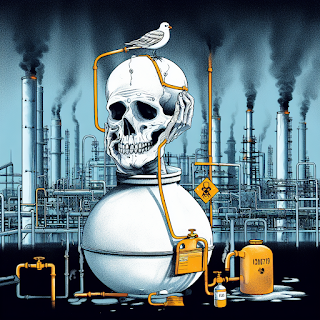Welcome
to my blog! Today I'm going to talk about a very important topic that affects
millions of people in India: the long-term health effects of the Bhopal gas
tragedy.
You might have heard of the Bhopal gas tragedy, but do you know what actually happened and how it impacted the lives of the survivors and their families? Well, let me give you a quick recap.
The Bhopal gas tragedy occurred on the night of December 2-3, 1984, when a leak of methyl isocyanate (MIC) gas from a pesticide plant owned by Union Carbide India Limited (UCIL) killed thousands of people and injured hundreds of thousands more in the city of Bhopal, Madhya Pradesh. It was one of the worst industrial disasters in history that still haunts the victims to this day.
The
leak was caused by a series of negligence and safety failures by the UCIL
management and staff, who ignored the warnings and signs of trouble in the
plant. The MIC gas was highly toxic and corrosive, causing severe damage to the
eyes, lungs, skin, and internal organs of those who were exposed. Many people
died instantly or within hours, while others suffered from chronic diseases and
disabilities for years.
So, what are some of the long-term health effects of the Bhopal gas tragedy? Well, according to various studies and reports, here are some of the most common and serious ones:
Respiratory
problems: Many
survivors developed respiratory problems such as pulmonary fibrosis, bronchial
asthma, chronic obstructive pulmonary disease (COPD), emphysema, and recurrent
chest infections. These conditions reduced their lung capacity and made them
vulnerable to infections and complications. As a result, some also suffered
from lung cancer and tuberculosis.
Eye
problems: Many survivors suffered from eye
problems such as keratopathy, corneal opacities, cataracts, glaucoma, and
blindness. These problems affected their vision and quality of life. Some also
experienced psychological trauma and depression due to their loss of sight.
Reproductive
problems: Many survivors suffered from
reproductive problems such as infertility, miscarriages, stillbirths, birth
defects, and genetic disorders. These problems affected their ability to have
healthy children and caused emotional distress and social stigma. Some also
faced increased risk of gynecological cancers and hormonal imbalances due to
the exposure to the toxic gas.
Neurological
problems: Many survivors suffered from
neurological problems such as memory loss, cognitive impairment, dementia,
Parkinson's disease, and Alzheimer's disease. These problems affected their
mental abilities and functioning. Some also experienced psychological problems
such as anxiety, post-traumatic stress disorder (PTSD), insomnia, and suicidal
tendencies.
Other
problems: Many
survivors suffered from problems such as diabetes, cardiovascular diseases,
kidney failure, liver damage, skin diseases, immune system disorders, and
cancers. These problems affected their overall health and well-being. Some also
faced social problems such as poverty, unemployment, discrimination, and lack
of access to health care and justice.
As
you can see, the Bhopal gas tragedy has left a lasting legacy of pain and
suffering for the survivors and their families. Even after almost 40 years,
they are still fighting for their rights and compensation from the UCIL and its
parent company Dow Chemicals. They are also demanding proper medical care and
rehabilitation from the Indian government.
The
Bhopal gas tragedy is not just a historical event that we can forget or ignore.
It is a reminder of the dangers of industrial pollution and corporate greed. It
is also a call for action to prevent such disasters from happening again and to
protect the health and dignity of the people who are affected by them.
Thanks
for reading my blog post! I hope you found it informative and interesting.
Please share your thoughts and comments below. And don't forget to subscribe to
my blog for more updates on health-related topics!

Comments
Post a Comment